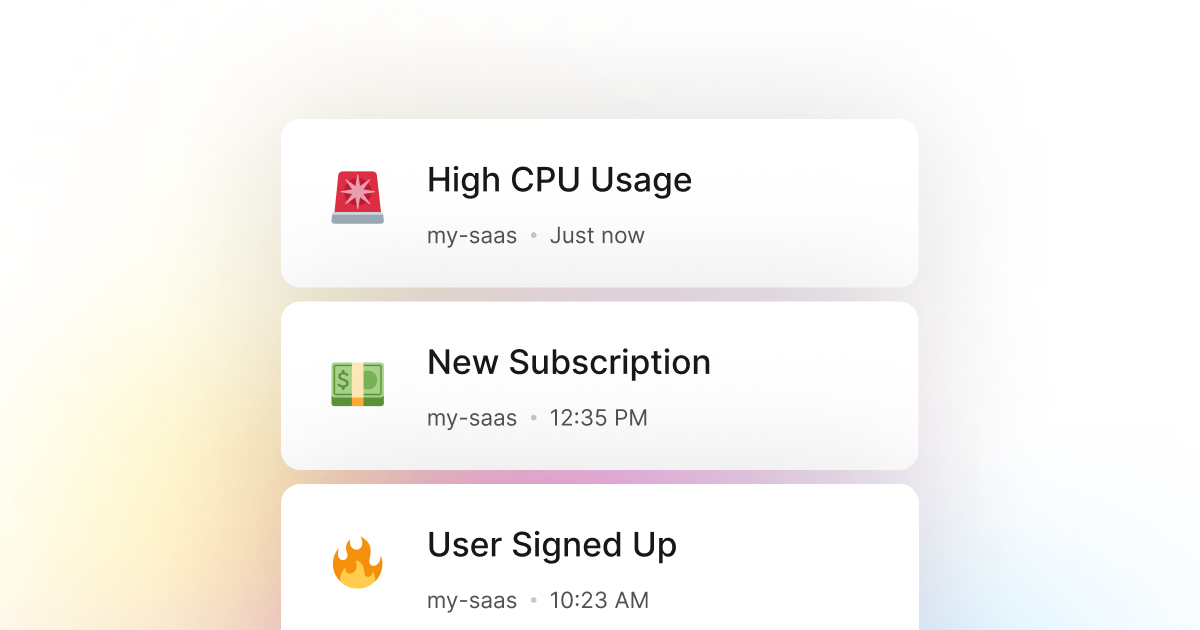When building a cURL application, we often have to think and deal with performance issues. Performance is a critical aspect of any application and can significantly affect the user experience. One of the most common performance issues for cURL applications is when the workload is CPU bound. This means that the application spends most of its time waiting for the CPU to complete a task.
In such cases, monitoring our cURL application's CPU usage and setting up a system to track when use goes above a certain threshold is essential. This way, we can always be aware of the performance of our application. Furthermore, in cases of a performance issue, for example, when the CPU usage goes above a certain threshold, we can take immediate action and fix the problem before it becomes a significant issue.
Fortunately, here at LogSnag, we have created a powerful solution for this problem. LogSnag is a powerful, real-time event tracking tool that works seamlessly with cURL. With LogSnag, you can set up event tracking for anything you want and monitor things like your CPU usage in real-time. In addition, you can set up a rule to notify you and your team when the CPU usage goes above a certain threshold. This way, you will always be aware of the performance of your application, and you can take immediate action if needed.
Setting up LogSnag
- Sign up for a free LogSnag account.
- Create your first project from the dashboard.
- Head to settings and copy your API token.
cURL code snippets
To track your CPU usage, you can use the following code snippet
Please don't forget to replace the YOUR_API_TOKEN with your API token and update the project and channel names.
Using cURL with cURL
cURL integration details
We believe that event tracking should be simple and accessible to every developer and team. Therefore, we have worked hard to create the next generation of event tracking tools. As a result, LogSnag is flexible and easy to use, making it a great companion for your cURL applications.
In addition to real-time event tracking, LogSnag provides powerful features such as cross-platform push notifications, event filtering, user and product journeys, charts, insights, and more.
LogSnag provides a generous free plan to get you started with event tracking. You can also check out our pricing page to see our paid plans. So please give us a try and let us know what you think!
Other use-cases for LogSnag
- Monitor your CI/CD build status for your cURL application
- Monitor when database goes down in your cURL application
- Monitor high disk usage in your cURL application
- Monitor when a user changes their email address in your cURL application
- Monitor failed logins in your cURL application
- Monitor failed payments for your cURL application
- Monitor memory usage in your cURL application
- Monitor MySQL downtime in your cURL application
- Monitor when a new feature is used in your cURL application
- Monitor your Postgres downtime in your cURL application
- Monitor Redis downtime in your cURL application
- Monitor suspicious activity in your cURL application
- Monitor when a user exceeds the usage limit for your cURL service
- Monitor when a user is being rate limited in your cURL application
- Get a notification when your cURL code is done executing
- Send push notifications to your phone or desktop using cURL
- Track canceled subscriptions in your cURL application
- Track your cURL cron jobs
- Track when a file is uploaded to your cURL application
- Track when a form is submitted to your cURL application
- Track payment events via cURL
- Track user sign in events in cURL
- Track user signup events via cURL
- Track waitlist signup events via cURL

